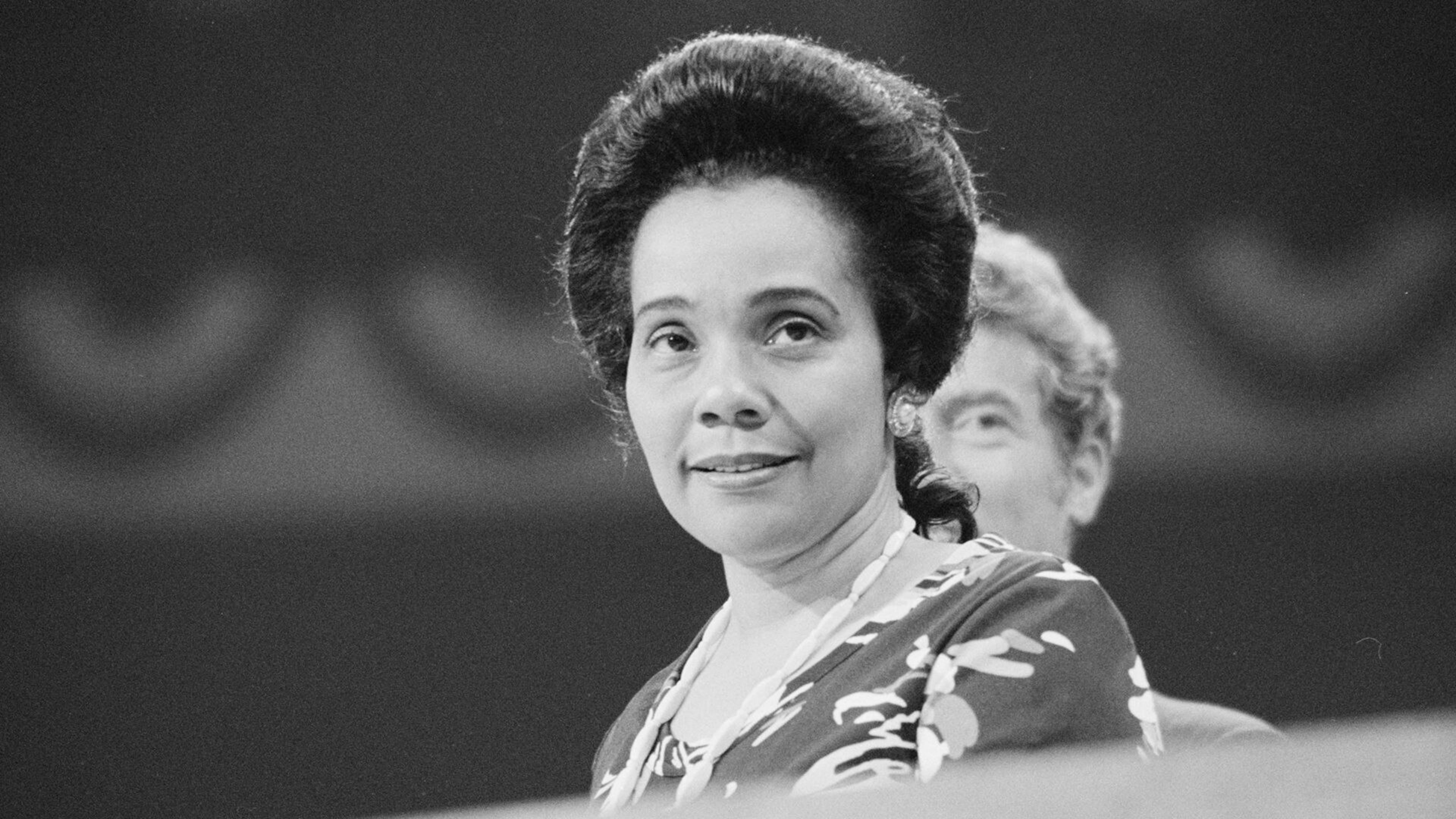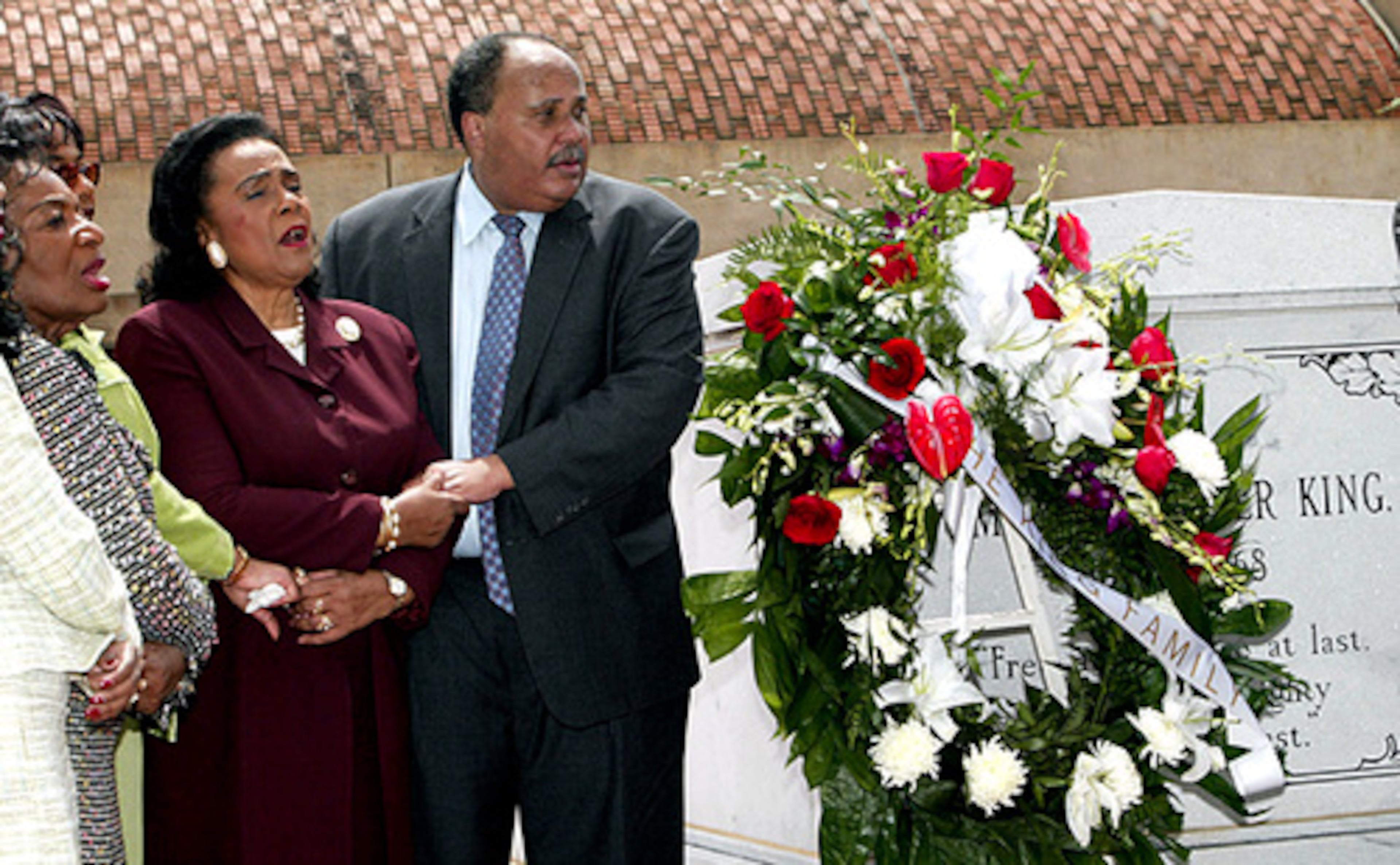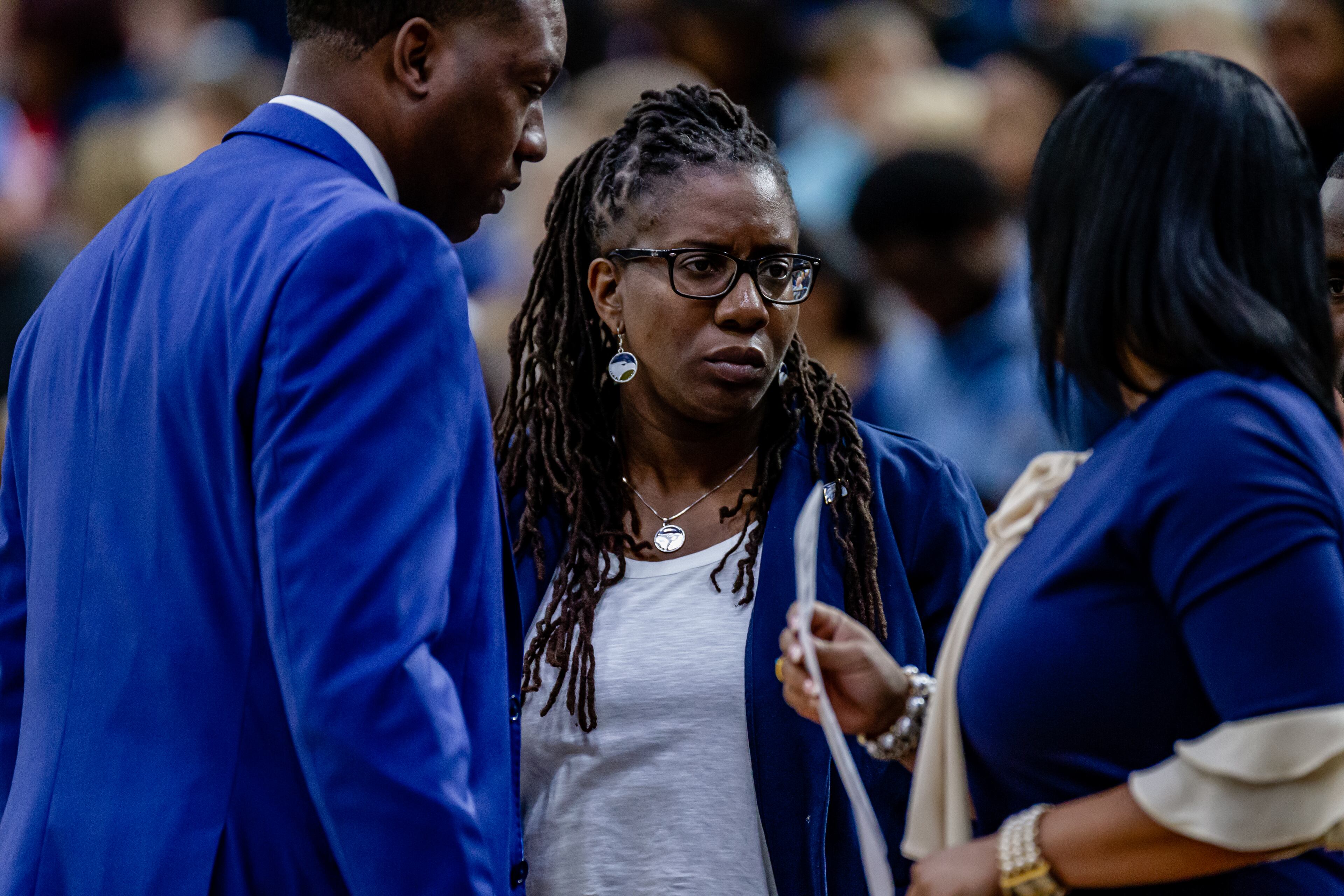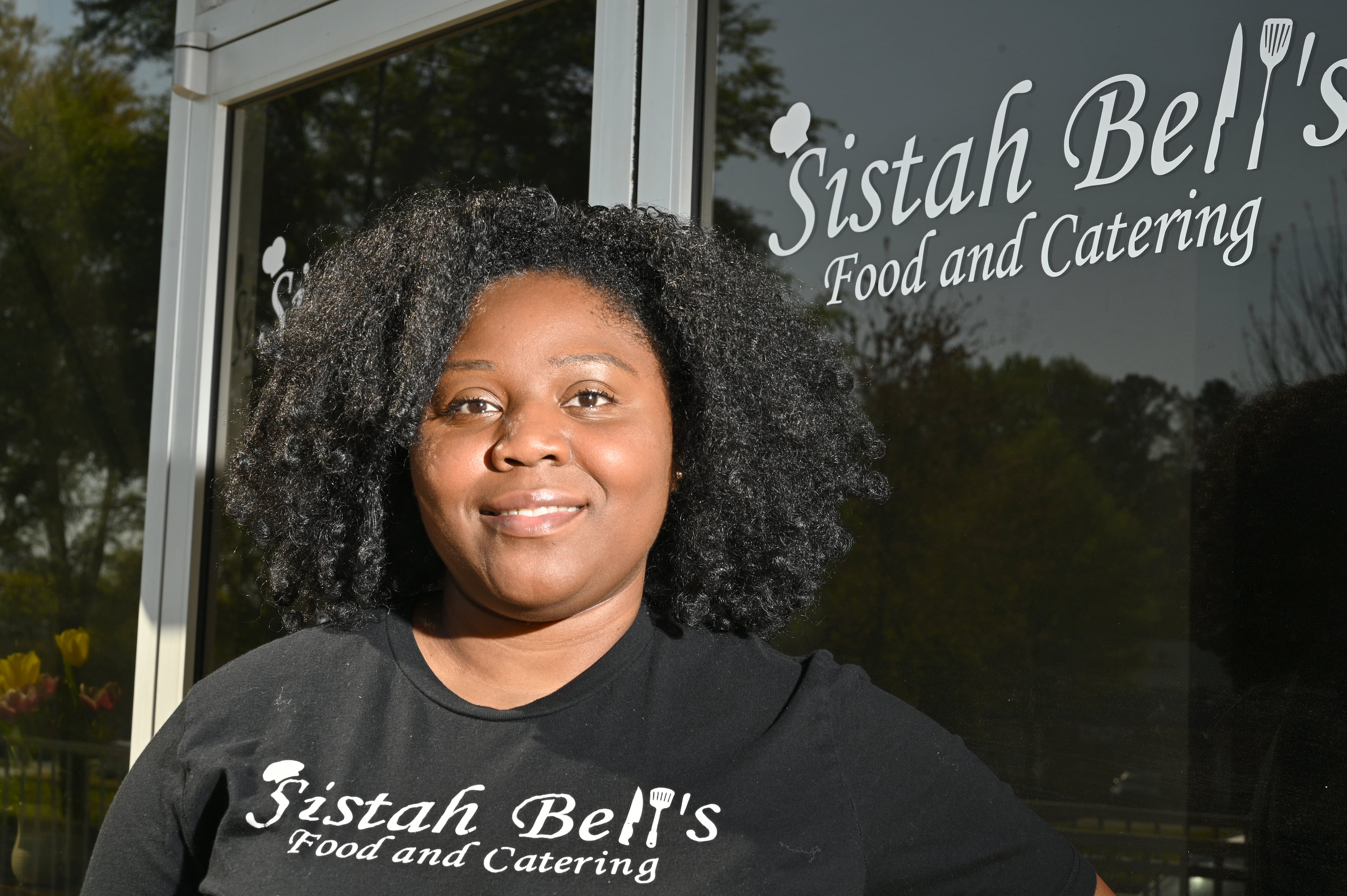Coretta, like Coretta Scott King

It was the January 2004 King Week and Coretta Scott King was in a familiar place — sitting at the head of a table signing copies of her book, “The Words of Martin Luther King, Jr.”
It would take nearly an hour for a nervous Atlanta woman to make it to the table and tell King something she had been wanting to share for 35 years.
When the woman gently set down her copy of the book on the table, King — one of the most recognizable and important figures of the civil rights era — barely looked up when she asked her her name.

“Coretta,” the woman said.
King looked at her, partly amused. Partly shocked.
“You mean to tell me you are named after me?” King asked her.
King smiled when Coretta Whipple said, “Yes, ma’am.”
King looked her up and down. She immediately knew that Whipple was from Atlanta. She immediately knew that Whipple was probably born in 1968.
Martin Luther King III was not at that book signing that day but remembers those rare occasions when his mother met someone named after her.
“Mom was always serious, but a big smile would come over her face and you could see a kind of joyous spirit come over her body whenever she met a Coretta,” King III said. “But Mom always focused on doing the work. She never went around promoting herself, so she was always so honored when she met someone named for her.”
King was right in her assessment of Whipple and her name.
Atlantans, and for the most part Blacks, are used to the name Coretta.
But in reality, the name is very rare and might be on the verge of dying out.
The highest concentration of usage of the name is by Black women in and around Atlanta who were born roughly after the assassination of Martin Luther King Jr.
“My mother was pregnant with me when Dr. King was assassinated. That was an intense moment because our leader had been killed,” said Whipple, who was born in June of 1968, two months after King Jr.’s death. If she had been a boy, her name would have been Martin.
In every case of the Corettas surveyed by The Atlanta Journal-Constitution, all were named after Coretta Scott King, who would have turned 94 on April 27.
They are teachers, business owners, lawyers, coaches, civil rights and social justice advocates and health care workers. All of them say they bear the weight of the name, even though some of them took a while to acknowledge it.
But even some close to Coretta Scott King, like her son Martin Luther King III, who went by the name “Marty” for years, understand the complications of bearing a famous name.
“At first, I did not understand the magnitude of it, but as I got older, I wanted to know everything about her,” said Whipple, who ended up talking to Coretta Scott King for 10 minutes, holding up the line. “She was so powerful and humble at the same time. It was like meeting the queen of the United States and to be named after her is such an honor.”
Coretta Hurt, a 51-year-old health care administrator in Snellville, puts it more succinctly: “My name is Coretta, so I cannot get in trouble. My name has to be associated with excellence.”
Conscious of ‘whose shoes I was walking in’

Like Whipple, Coretta Hurt was also going to be named Martin if she had been born a boy in October 1969 in tiny Lunenburg County, Virginia. Between 1967 and 1970 in the U.S., 15,000 boys named Martin were born.
In 1963, the year King Jr. delivered his “I Have a Dream” speech at the March on Washington, more than 6,000 Martins were born nationwide, followed by 5,700 more the following year, according to Social Security Administration baby name data collected and archived by statistician Hadley Wickham.
Hurt’s parents, both Baptist ministers, were actively involved in politics and engaged their children in discussions about race and civics.
Lewis and Eva Hurt also taught their five children, all of whom they sent to college or the military, strength.
That is why when Hurt graduated from St. Paul’s College, a now-closed Black college in Virginia, she flatly rejected advice to go by her middle name — Sue — and emphasize her middle name on job applications and resumes.
“Because they were automatically gonna know that I am Black. The hell with that,” Hurt said. “The weight of having that name has always been on me. Not in a negative way, but I was always conscious of the fact of who I was named after and whose shoes I was walking in.”
Hurt runs a 200-bed senior facility in Snellville, and her name resonates with the community that grew up with the name.
“With me working in geriatrics, it is always an opening,” Hurt said. “When I say my name, they will always ask, ‘Loretta?’ I say, ‘No, Coretta, like Coretta Scott King.’”
But there is the other end of that.
Women named Coretta say they are increasingly running into younger people — disturbingly, Black — who have no idea who Coretta Scott King was. On a recent trip to a sandwich shop, Hurt said a young cashier was literally perplexed by the name.
“There were some other Black women in line, so we had to educate him,” Hurt said. “We went in on him pretty hard, because he needs to know who Coretta Scott King was. The sad part is, young people just don’t know. And there are not many of us left.”
Back to being a rarity

When Coretta Scott was born on April 27, 1927, she was one of only seven Corettas named in the United States that year, according to the federal data. In the five-year period around her birth, an average of only eight Corettas were born annually.
In several books and publications that track name origins, “Coretta” is an English variation of the Greek name “Cora,” meaning “maiden.”
In each instance, Coretta Scott King is the only example mentioned.
In her 2012 biography of her sister, “Desert Rose: The Life and Legacy of Coretta Scott King,” Edythe Scott Bagley wrote that the widow of the civil rights icon was named for their grandmother, Cora McLaughlin Scott, who died before they were born.
“By temperament, Coretta was most like her grandmother,” Bagley wrote. “Constantly working and always active, Grandmother Scott was an eternal optimist with a compulsion for orderliness.”
For most of the first half of the century, the name Coretta was rare in America. (Story continues below interactive graphic.)
Beginning in 1880 — the first year for which the Social Security Administration has tracked baby names — the records show fewer than five babies born in America each year named Coretta, a trend that continued for nearly three decades.
And between 1909 and 1955, the annual number of newborn Corettas broke into double digits just 13 times.
In 1955, there were 13 Corettas born.
But that was also the year Coretta Scott King arrived. On Dec. 1, 1955, Rosa Parks refused to move to the back of a bus, launching the Montgomery Bus Boycott several days later.
Martin Luther King Jr., a young pastor at Montgomery’s Dexter Avenue Baptist Church, was chosen to lead the local efforts and became a national figure. His wife, with statuesque beauty, was always by his side.

Coretta Johnson Gray heard a lot about those days. Her father, Samuel, was born in Camden, outside of Selma, Alabama. Her mother, Pollie, was the youngest of 16 children born and raised in Macedonia, Alabama, just outside of Montgomery.
“My grandparents were not very active in the civil rights movement,” Gray said. “My mother remembers the march from Selma to Montgomery coming through, but while they saw, heard and experienced the movement, they were not involved.”
In 1956, while the boycotts raged, 21 babies were named Coretta. The most ever — up to then.
It was still small, but usage of the name remained in double figures yearly throughout the heart of the civil rights movement — until 1968.
In the year that King Jr. was assassinated, the rate at which American parents named their babies Coretta increased by a factor of 25 over the previous year, federal data show — a total of 336 Corettas were produced, a rate of 9.6 Corettas per 100,000 live babies born in the U.S. Those were followed by nearly 200 more Corettas in 1969 and nearly 150 more in 1970.
That was the last year the name was in the triple digits.

Its incidence remained in double digits until 1996, when only six Corettas were born nationally. There was a brief bump to 13 in 2006, the year Coretta Scott King died at age 78.
The year 2018 saw the most Corettas born in a quarter century, 18. But that number dropped to 14 in 2019, putting the name’s usage firmly back to pre-1950s levels. By comparison, Olivia, the top female name of 2019, was given to more than 18,000 baby girls that year.
Since the end of World War II, there have been more than 2,000 Corettas born in the United States, although it is unclear how many remain in the country.
But according to state voter rolls, a substantial chunk of them appear to live in Georgia.
There are at least 215 registered voters in the state with the first name of Coretta, according to an Atlanta Journal-Constitution analysis of state voter records from earlier this year. The largest single slice of them — 34 — were born in 1968.
According to the voter records, only two Corettas remain in Georgia who were born before Coretta Scott King came into prominence in 1955. Both women were born in 1950.
Nearly all of the Corettas listed on the voter rolls identified themselves on their voter registration cards as Black, the AJC found.
“You don’t know white people named Coretta,” Hurt said.
A valued legacy

Like all royal families, the Kings have always been intentional in their naming conventions in an effort to hold on to family traditions and maintain a sense of strength.
It starts with King’s parents, Alberta Christine Williams and Michael “Daddy” King.
Daddy King was born Dec. 19, 1899, in Stockbridge as Michael King.
In 1927, his wife gave birth to Willie Christine King, named after the mother and grandmother.
On Jan. 15, 1929, he named his first son, Michael King Jr., after him.
Then in 1934, after a trip to Germany for the Baptist World Alliance conference, where he witnessed the infancy of Nazism and visited sites associated with reformation leader Martin Luther, he changed his name to Martin Luther King Sr.
And with it, his firstborn son became Martin Luther King Jr.
A younger son would be named Alfred Daniel Williams King. He would be known as “A.D.” after his grandfather, the Rev. Adam Daniel “A.D.” Williams.
King Jr. would name his first son Martin Luther King III and his second son, Dexter Scott King, after Dexter Avenue Baptist Church in Montgomery. Their youngest child, Bernice Albertine King, was named after both of her grandmothers, Bernice McMurry and Alberta Christine Williams.

In 2008, when King III’s wife, Arndrea, was pregnant with Coretta and Martin Luther King Jr.’s first grandchild, she wanted to name her Cora.
King III resisted the temptation and named her Yolanda Renee, after his late sister Yolanda Denise, who died in 2007. As a child, Yolanda Denise often lamented the fact that she was not named after anyone in the family.
"So we decided to honor her," King III said.
But King III was also going by experience.
Becoming a King
Martin Luther King III was born in 1957, a year after his father became one of the most recognizable Black men in America and after a bomb ripped through their Montgomery home, nearly killing his mother and Yolanda.
Following family tradition, King Jr. wanted his first son to carry his name. Coretta Scott King was more cautious.
“Mom was very concerned because she knew that he was going to be a significant figure, and for a child, it is hard to live in that shadow,” King III said.
King III said his mother tried to protect him. She told him that he didn’t have to be a preacher or even attend his father’s alma mater, Morehouse College. He even altered his name, going by the familiar, but vague enough, “Marty.”

“I was a shy young man coming along and I didn’t want people to treat me differently,” King III said.
In the fall of 1975, Marty King did enroll in Morehouse and tried to fly under the radar. But as early as freshman orientation, his classmates were told stories about “Morehouse’s greatest alumni, Martin Luther King Jr.,” and how his son was a member of the class.
He remembers shooting basketball with a classmate, Michael Cox, who would eventually be his roommate. Someone interrupted the game by announcing that he was the son of Martin Luther King Jr.
“He stops in the middle of the game and looks at me and says ‘Marty King?’” King III said. “He said, ‘If I were the son of Martin Luther King Jr., I would be running this joint.’ But I just wanted to be like every other student. I didn’t want the recognition or attention. Just go out and do the work.”
It wasn’t until 1986, when he was elected to the Fulton County Commission, becoming the first of his parents’ children to become directly involved in politics, that he ditched the name “Marty.”

“I don’t like ‘Marty’ at all. I am Martin Luther King III,” he said, adding that he didn’t want to place that kind of pressure on his daughter. “Yolanda Renee is who she is and quite different than I was as a child. She is gonna do amazing things in the world.”
A commitment to justice
Coretta Johnson Gray, whose mother was from outside of Montgomery and whose father was from outside of Selma, was born in 1978 in Baton Rouge. Her parents, who met at Tuskegee University, were the first in their families to go to college. They both were later commissioned as officers into the U.S. Air Force.
Her parents, who had stayed out of the civil rights movement as children, never really told her why they named her Coretta, other than the fact that the first names of each of her two older sisters also began with the letter C.

“But I love it. I greatly admire her, because she carried herself in such an honorable way,” said Gray, 42. “It means that there is a legacy to live up to, and a positive one.”
But for Johnson, the footsteps she most closely followed were her parents. She too attended Tuskegee, before getting a law degree from Vanderbilt University. She then joined the Air Force, serving for 13 years in the Judge Advocate General’s (JAG) Corps.
It is there that she shifts her thinking toward King.
“I wanted to work on disparities in military justice. I use it as a call to arms,” said Gray, who is now working as a legal defense attorney and consultant for service members. “I have taken my inspiration to be an advocate for politics and criminal justice reform. It is part of my legacy.”
But that is not always the case, especially for Corettas born considerably after the civil rights movement.
‘It was just a name’
Coretta Brown, who might be the second most famous Coretta, was born in 1980 and is the assistant coach of the Georgia Southern University women’s basketball team. She said the name grew on her, although she flirted a while with her middle name, Renee.

“It was just a name until I started reading behind it,” said Brown, 40.
At the University of North Carolina, where she was voted All-ACC three times for her work on the basketball court, Brown majored in African American Studies, and the name Coretta Scott King kept popping up.
“Then when they started announcing my name on the court, ‘NUMBER 14, CORETTA BROWN,’ it started to mean something,” said Brown, who was the 11th pick in the 2003 WNBA draft and spent four years in the league. “It is a badge of honor to share her name because we have a lot of characteristics, namely being loyal, outspoken and for the people. Now, whenever someone asks my name, I say ‘Coretta’ and I throw up the fist.”
‘Destined for greatness’
On Jan. 15, 1985, on what would have been King Jr.’s 56th birthday and a year before America celebrated Martin Luther King Jr. Day for the first time as a national holiday, Coretta Whatley was born.
“My mom was in labor for several days in bed watching all of the King coverage, and they thought Coretta would be a great, strong name for their firstborn daughter,” Whatley said.
But growing up in New Hampshire, which is about 95% white, the name had no significant meaning, other than just being her name. Then she moved to Georgia in 1999 when she was in the eighth grade.
“In Georgia, it was like Black History Month every month, so I was learning about my culture every day,” Whatley said.

The more she learned about King, the more she became invested. Her father helped by dragging her in front of the television every time King was on television.
Last September, in the middle of the pandemic, Whatley opened up her first restaurant, Sistah Bell’s, in Stockbridge.
“I felt like I was destined for greatness because of the name,” Whatley said.
Strengthened and inspired

On Jan. 30, 2006, a little more than two years after Coretta Whipple met her eponym, Coretta Scott King died of ovarian cancer.
Just 24 days later, on Feb. 23, 2006, Whipple went to the doctor for her first-ever mammogram.
“I was 37 years old, living my life, and the doctor told me that I had breast cancer,” Whipple said. “It hit me like a ton of bricks, but I couldn’t help but think of Mrs. King.”
Through surgery and radiation, Whipple beat cancer and has been in remission for 15 years. In the interim, she has become an advocate for women with cancer — coaching, counseling, driving them to chemo and, in some cases, holding their hands at the end.

Whipple pulls her copy of “The Words of Martin Luther King, Jr.” from a shelf and turns to the title page to see the autograph of Coretta Scott King. She pauses at the memory of that day 17 years ago.
“I think about that day I met Mrs. King and she told me to become a leader, an advocate for the community and to always treat everyone with kindness and respect,” Whipple said. “I have never tried to dishonor her name in any way.”
Newsroom Data Specialist Jennifer Peebles provided the data research for this article.

